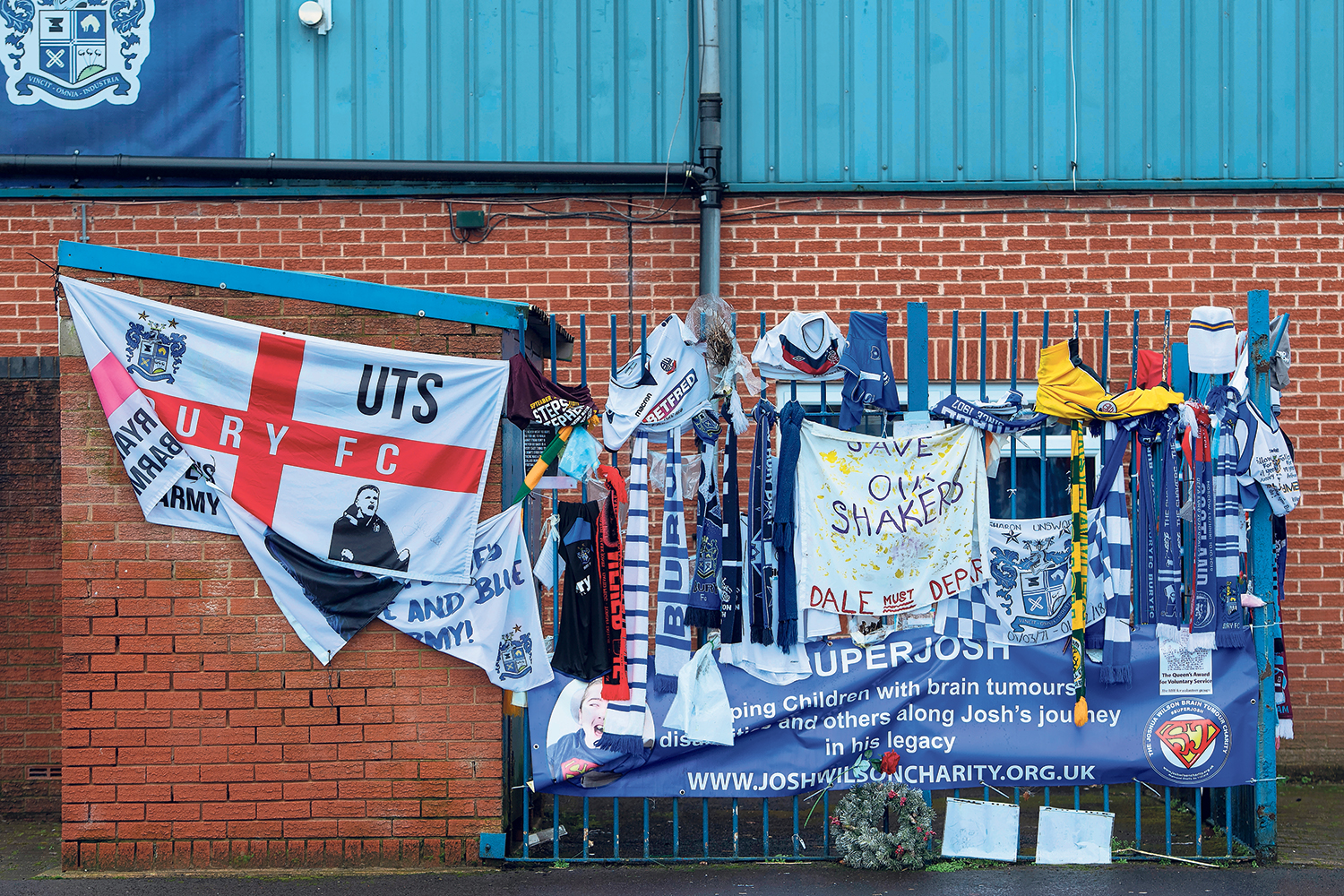‘Vincit omnia industria” proclaims the badge of Bury Football Club. I learnt my Latin in Bury once upon a time, so I know that this means “industry conquers all” and indeed it does. Five years after going into liquidation, Bury have just won the North-West Counties League, the ninth tier of English football, with 109 points from 46 games. Never mind Liverpool, Tottenham or Chelsea. This is the trophy that counts.
There had been a football club in Bury since 1885 when suddenly, in November 2020, Gigg Lane fell silent. It’s a sorry tale of financial irregularity meeting weak regulation. The owner, Stewart Day, offered Gigg Lane, which had been gifted to the club by the Earl of Derby in 1922, as security for a £3.7million loan from a company called Capital Bridging Finance Solutions. That was then remortgaged to a company registered in Malta who were owned by an outfit in the British Virgin Islands. When the debt repayments became too much, Day sold the club for £1 to Steve Dale, who made a set of promises, none of which turned out to be true.
It was obvious – as clear as Day you might say – that the scoundrel should never have been there. Then, the transfer of ownership to Day was subject to no serious scrutiny by the Football League. The government is legislating for a football regulator which must surely be judged by whether it prevents a recurrence of the kind of financial imbroglio that took Bury under.
The brief spell during which Bury had no club at all was followed by a farcical couple of years when it had two. The Shakers Community Society had a team but no ground; the fans’ group, Est 1855, had a ground but no team. It took some delicate negotiating – and two local referendums that made Brexit look like a pleasant chat – to get the team into the ground.
It is still hard for Bury to pay its way. The Deloitte Annual Review of Football Finance shows year after year that clubs in the Championship collectively spend more on wages than they earn in revenue. But Bury Football Club is not first and foremost a business. It makes more emotional sense than financial sense. There is no other activity in Bury, or in any other mill town for that matter, which will attract more than 3,000 people out on a Saturday afternoon.
The Cemetery End no longer sounds like a metaphor for the demise of a club that means so much
The Cemetery End no longer sounds like a metaphor for the demise of a club that means so much
Football clubs are one of the ways we measure out our lives. Bury means my mother’s memories of Colin Bell, the finest player to grace Gigg Lane, and Alec Lindsay, the local boy who was signed for Liverpool by Bill Shankly. The club recently conducted a poll of fans to select 41 legends to adorn the wall at the Manchester Road end. There is John Forrest, Les Hart, Derek Spence, Jack Plant and the great goalscorers Norman Bullock and Craig Madden. Maybe the stars of this season, the Latvian striker Rustam Stepans and the peripatetic Djavan Pedro, will write their names on that wall.
Not all of those legends will mean anything outside Bury, but that’s the point. It’s a local tradition, a shared communal memory. It’s the residual romance of the game, the bonds and loyalty of the town. Manchester City and United are only down the road, but you cannot understand places like Bury unless you reckon on its autonomy from the metropolis six miles away. Bury is part of Greater Manchester but it is still a place unto itself and its football club is a proud proclamation of that identity.
In 1900, Bury beat Southampton 4-0 in the FA Cup final. Three years later, they did it again, beating Derby County 6-0 at Crystal Palace. It has been a long wait for a third Cup victory and the rest of the 20th century was a bit thin, but you never know. Promotion to the Northern Premier League West Division is the stuff that dreams are made of, much more so than a Premier League which is as predictable as showers in April.
I shall take a trip to the first game of next season, to look out on one of the best pitches in England from the Cemetery End which, for the moment at least, no longer sounds like a metaphor for the demise of a club that means so much.
Photograph by Visionhaus
Newsletters
Choose the newsletters you want to receive
View more
For information about how The Observer protects your data, read our Privacy Policy

